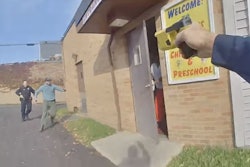Mandatory. Minimum. Required.
These are three of the most unfortunate words in all of law enforcement training.
From Alabama to Wyoming—and every state in between—there are mandatory minimums of required training (oftentimes including field-training, or FTO) before an officer can be sworn into service, and hours upon hours of compulsory in-service education logged into personnel records annually. The national average for those requirements is roughly 650 hours of academy training and 51 hours of FTO time.
For example, in California, officers must basic complete 664 hours of police training and 560 hours of FTO time before rolling out on their own. In Georgia, 408 hours are spent in academy training and zero hours are required in FTO. In Tennessee, 480 academy hours and 960 FTO hours are necessary.
Needless to say, everyone completes this training—and for the most part, everyone is happy enough to do it—but those who truly excel at any enterprise do far more than what is the mandatory minimum required.
However, going above and beyond getting regularly re-certified in everything from blood-borne pathogens to radar operations is time consuming and financially costly. So why do it?
As it happens, taking on the challenge of attending training above and beyond what is merely required can have myriad benefits—from increasing the prospects of promotion to simply preventing an untimely demise.
Profession, Practice, or Both?
Jamie Borden, a retired sergeant with a large police department in Nevada and founder of Critical Incident Review (CIR), says, "In our society, we have professions that are practiced, right? We have medical doctors that practice as doctors. We have lawyers that practice law. Yet law enforcement officers are not considered a practice."
Borden says, "We require as much or more continuing education in the subject matter that we're operating in—not only for liability purposes in dealing with the public, but for safety and decision making that is consequential to our very own life and death or the life and death of those that we serve."
However, for a host of reasons, some of the training that places police officers in a position to be considered truly practitioners is not required by the state.
Borden says that officers who reach a level of proficiency that can be considered professional practice all tend to have one thing in common—they've sought out and completed training well above and beyond the mandatory minimum required.
"An officer that it is concerned with professional development is going to excel in the law enforcement practice, That person is going to become [someone] leaders depend on."
Borden adds, "Officers that seek out training—and departments that support it—are literally improving the professionalism of their departments."
Return on Investment
Regularly attending training outside of the mandated minimums is an investment in both time and money. Borden says that such an investment benefits both the individual officer and the organization to which they belong.
Attending training "above and beyond" what an agency requires by policy or a state requires by law has obvious benefits from a professional advancement standpoint for the individual. That person is better prepared for promotion, of course, but also has probably gained additional respect among their peers.
Borden says, "They become an informal leader because they have the foundational knowledge—they've got the drive, they've got the enthusiasm—to be good at what they do," Borden says. "Individuals with far more time on the job turn to those individuals for leadership. Those informal leaders are then pushed into a place of leadership. They aren't promoting for the stars, bars, or cars. They're promoting because they are needed in those positions."
Borden says that those individuals promote because they're needed—because people within the department itself and the community at large—depend on them and their commitment to the profession.
"That's where we have leadership that the department can depend on," Borden says. "We have leadership that has a foundation of knowledge based on professional development and based on their desire to be good at the job and to make the department a better place. I think it's a fire that once catches, it starts to create betterment that everyone—including the communities—benefit from. Not just the officer, not just the department, but the municipality, the people in the community, everyone benefits from a department that is better."
There's also the important element of ensuring against becoming the subject of an internal investigation or frivolous litigation. Just about every activity an officer engages in can be improved through additional training.
"Training may not be required of you to do your job or to carry a specific weapon system. However, because it's not required doesn't mean you shouldn't seek out the training to be good, conditioned and to cover your own ass," Borden says. Document your own training, keep solid records of the training you receive, including certificates.
Borden points to instances in which an officer may be alleged to have not sufficiently trained in the use of a tool, tactic or a department practice that can potentially result in substantial bodily harm or death, even if the cause of the outcome is not related to the officer’s decision. The cause may beequipment failure or other mitigating factors.
"Oftentimes when [officers] get into these critical incidents, the scrutiny turns brutal and they're being charged with crimes," Borden says. "I think that officers really need to give consideration to getting additional training relevant to their role in the street—to really take that extra time to get training to bolster what it is that you do in the world of law enforcement."
Seeking (and Finding) Training
How would you go about finding out where you would get that training? Where would you look? Who would you talk to?
One of the best—and easiest—avenues to find excellent professional development opportunities is to simply become active in professional organizations outside of the department. There are countless statewide Patrolmen's Benevolent Associations, Police Officers' Associations, and Unions. There are also affiliations for specific areas of specialty such as Detectives/Investigators, K-9 Handlers, Narcotics Officers, SWAT Operators, and others.
"Get on LinkedIn—become a member of LinkedIn," Borden says. "Get on any of the social media that are law enforcement supportive. "However, be cautious of airing your opinions and inflammatory interactions—these conversations will follow you forever."
Borden says, "Talk to everybody. Get input from everyone. Figure out what it is a that you're interested in—whatever discipline you're interested in—and seek it out. There's a thing called Google. If you put in your desire, you're going to start going down a rabbit hole where you are going to find anything you want to look for. Read the magazines. It just takes a little bit of research."
A Well-Worthwhile Endeavor
Finally, if you are better at your job, you're going to be—generally speaking—happier at it. Even a person who is entirely without ego—and someone lacking ego is a very rare person in law enforcement—typically derives some sense of self-worth from being good at their chosen vocation. Everyone in the law enforcement profession can aspire to being considered "top of the class" or "best of the best"—a well-earned (even if unofficial) badge of honor.
At a time when morale in the law enforcement profession is approaching all-time lows, anything that can help individuals take more pride in their chosen line of work seems to be a well-worthwhile endeavor.
















